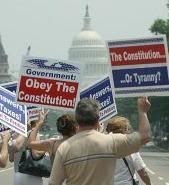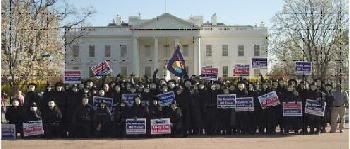Article On Larken Rose And Ed Brown
Brown cited his video, 'Theft by Deception'
Like Plainfield's Ed and Elaine Brown, Pennsylvania resident Larken Rose believed so strongly he wasn't required to pay income taxes that he was willing to battle the federal government in court.
Unlike the Browns, Rose - who in January finished serving his prison sentence for failing to file tax returns - no longer thinks the battle was worth it.
Read more here.












4 Comments:
Read the following, and pay particular attn. to the final paragraph.
Rose was disillusioned after seeing a jury of his peers so ready to believe the arguments of government prosecutors, he said. "Basically, I regret having put my freedom in the hands of the American public because they're utterly clueless and not deserving of the freedom they still have," Rose said.
Rose's own argument is that tax laws don't define the income of American citizens working within the United States as taxable.
But Rose said he was prevented from presenting his views as evidence in court. As a result, he said, the jury only heard the government's side of the story before sentencing him to 15 months in prison. (Rose said he was in prison for just over a year before his release.)
The complaint echoes many voiced by Ed and Elaine Brown, who have said that they weren't allowed to give a full account of their anti-tax views in Judge Steven McAuliffe's court and that the judge misdirected jury members when he told them that the constitutionality of the IRS code was not on trial.
Yet outside legal observers have stated that McAuliffe gave the Browns unusual leeway in explaining their belief that there is no law making them liable for income taxes. For example, McAuliffe rejected the argument of U.S. prosecutors that the couple shouldn't be allowed to present their theories at all, since they might confuse the jury.
"I think the judge went considerably farther than he had to," said Michael Mello, a criminal justice professor at Vermont Law School who has followed the Brown case. "I don't think he was required to let in any evidence about why they believed they weren't required to pay their taxes. That's not something that the government had to prove as an intent element."
------------------------
Mello... stating that:
"I don't think he was required to let in any evidence about why they believed they weren't required to pay their taxes"...
...IS TOTALLY ABSURD!
EVERY STATUTE MUST BE READ IN LIGHT OF THE CONSTITUTION! THE JURY HAS NO POWER AT ALL WHEN A CORRUPT JUDGE CAN DENY THEM EVIDENCE AND TESTIMONY, OR FEED IT TO THEM FROM ONLY ONE SIDE!
Also... This Fascist Mr. Mello, Comparing the Browns to a former Client of His who happens to be a Murderer, is friggan rediculous!
What a Puke!
Thanks for the Post.
Larkin... We all know that what You did for US came at no small Price to You and Your Family.
And that that Price can never be Repaid to You. I just want to say... You, and Your Family... Should be very Proud of what You've done. I am... You have My gratitude and Respect. You My Friend... Are a True Patriot. And an Example of what Every Citizen in this ONCE GREAT NATION should Strive to be.
From the Case of Irwin Schiff, EAT THIS!
The Brushaber Court went on to point out (at pages 11-12) that there cannot be a federal tax “lying intermediate between these two great classes and embraced by neither,” and that the proposition that the 16th Amendment gave the government the power to impose a direct, non-apportionment income tax as claimed by this Court:
If acceded to, would cause one provision of the Constitution to destroy another: that is, they would result in bringing the provisions of the Amendment exempting a direct tax from apportionment into irreconcilable conflict with the general requirement that all direct taxes be apportioned. Moreover, the tax authorized by the Amendment, being direct, would not come under the rule of uniformity applicable under the Constitution to other than direct taxes, and thus it would come to pass that the result of the Amendment would be to authorize a particular direct tax not subject either to apportionment or to the rule of uniformity…This result …would create radical and destructive changes in our constitutional system and multiply confusion. (Emphasis added)
Defendant provided this court with numerous excerpts from Brushaber and other Supreme Court decisions which specifically declared that the 16th Amendment: 1) did not give Congress any new taxing power, and 2) the 16th Amendment merely allowed Congress to impose an income tax in the form of an excise tax, and not in the form of a direct tax, as incorrectly claimed by this Court - since an income tax imposed as an excise tax would not need to be apportioned because excise taxes are not subject to this requirement. This Court had to know this from the following quotations that were supplied to this Court:
The whole purpose of the Amendment was to relieve all income taxes when imposed from apportionment from a consideration of the sources whence the income was derived.
Thus the “whole purpose” of the 16th Amendment was not to amend the Constitution and give Congress a new taxing power, but to provide for a tax on “income” separated from the “sources” that produced the “income.” So the sources themselves (such as wages, dividends, interest, alimony, rents, capital gains that produced the income) would not be “considered” and thus directly taxed, since a tax placed directly ON such sources would have to be apportioned, as held in Pollock v. Farmers Loan and Trust, supra, which ruled the Income Tax of 1894 unconstitutional for this reason. As stated in Brushaber, “the 16th Amendment contains nothing repudiating or challenging the ruling in the Pollock case.” (The government, remember, in its Answer, argued that the 16th Amendment overturned Pollock. Defendants pointed out to this Court the erroneous nature of that claim as proven by the above quotation, and also pointed out that the Brushaber decision contained numerous references to the Pollock decision.) Defendants also pointed out to this Court that since the 16th Amendment did not “overturn” Pollock, it was still bound by that decision. However the Court’s Order of June 16, 2003 flies in the face of that decision, as this Court has to know.
Consequently, the Court’s claim that the 16th Amendment gave the government a new power to levy a direct tax on income without apportionment is a frivolous claim. The following quotations (all of which were supplied to this Court) further prove that the Supreme Court ruled that an income tax was, 1) in its nature an excise tax which had to be imposed as such, if the tax were to be legally compulsory, and 2) Congress received no new taxing power as the result of the 16th Amendment, which, therefore, did not “amend” the Constitution in any way.
The provisions of the 16th Amendment conferred no new power of taxation… (Stanton v. Baltic Mining supra.)
The Sixteenth Amendment must be construed in connection with the taxing clauses in the original Constitution and the effect attributed to them before the Amendment was adopted. (Eisner. v Macomber, supra,)
A tax on income was in its nature an excise entitled to be enforced as such (since) taxes on income has been sustained as excise taxes in the past. (i.e. during the Civil War). (Quoted from the Brushaber decision)
The Amendment…excludes the criterion …for the purpose of destroying the classifications of the Constitution by taking an excise (the income tax) out of the class to which it inherently belongs and transferring it to a class in which it cannot be placed consistently with the requirements of the Constitution. (Brushaber, supra)
The provisions of the 16th Amendment conferred no new power of taxation but simply prohibited (a tax on income) from being taken out of the category of indirect taxation to which it inherently belonged and being placed in the category of direct taxation subject to apportionment by a consideration of the sources from which the income was derived” (Stanton v. Baltic Mining, supra)
The Sixteenth Amendment must be construed in connection with the taxing clauses in the original Constitution and the effect attributed to them before the Amendment was adopted. (Eisner v. Macomber, supra.)
A proper regard for its genesis…require that the (16th) Amendment shall not be extended by loose construction…so as to repeal or modify…those provisions of the Constitution that require an apportionment…for direct taxes upon property, real and personal. (And wages and dividends are personal property) This limitation still has an appropriate and important function, and is not to be overridden by Congress or disregarded by the courts. (Eisner v. Macomber, supra.)
Since all of the above holdings prove defendants’ claim that the income tax is not imposed either on the basis of apportionment or as the indirect, excise tax, the Supreme Court ruled it to be; defendants have proved that the income “tax” at issue is not “directly traceable to the (Government's) constitutional power to lay and collect taxes.”
Post a Comment
Subscribe to Post Comments [Atom]
<< Home